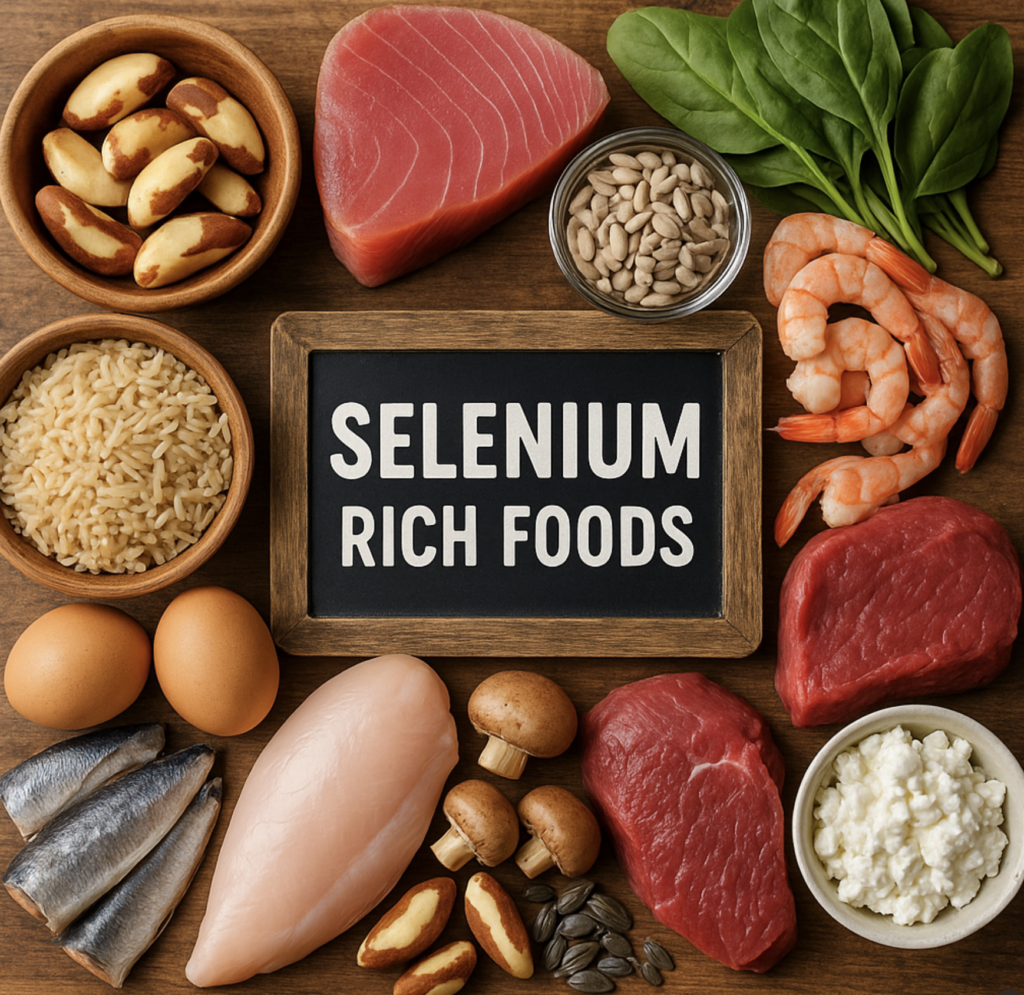Selenium is a trace mineral with powerful antioxidant properties that support thyroid health, immune resilience, fertility, and cellular defense. Though your body only needs a small amount, getting enough selenium daily is crucial for long-term vitality. In this post, you’ll learn why selenium matters, signs of deficiency, and the best selenium-rich foods to include in your diet.
What Does Selenium Do in the Body?
Selenium plays a vital role in activating antioxidant enzymes, regulating thyroid hormones, and maintaining a robust immune response.
✔ Key Functions of Selenium:
- Protects against oxidative stress and cell damage
- Supports healthy thyroid hormone metabolism
- Boosts immune system function
- Enhances fertility in both men and women
- May reduce cancer risk (prostate, lung, colorectal)
💡 Did You Know? The thyroid gland contains more selenium per gram of tissue than any other organ in the body.
Top Health Benefits of Selenium
✔ 1. Strengthens Immune Function
Selenium enhances the production of white blood cells and antibodies, improving your defense against infections.
✔ 2. Supports Thyroid Health
It helps convert the thyroid hormone T4 into its active form, T3, and reduces inflammation in thyroid tissues.
✔ 3. Acts as a Potent Antioxidant
Selenium is a critical component of glutathione peroxidase, an enzyme that neutralizes harmful free radicals.
✔ 4. Promotes Fertility and Reproductive Health
Selenium improves sperm motility in men and egg quality in women.
✔ 5. May Help Protect Against Certain Cancers
Studies suggest selenium’s antioxidant properties may lower the risk of prostate, lung, and colorectal cancers.
Signs of Selenium Deficiency

⚠️ Common Symptoms:
- Fatigue or brain fog
- Hair thinning or brittle nails
- Frequent infections or weakened immunity
- Hypothyroid symptoms (e.g., weight gain, cold intolerance)
- Infertility issues or pregnancy complications
💡 At-Risk Groups:
- People with digestive disorders (e.g., Crohn’s disease, celiac)
- Dialysis patients
- Individuals living in regions with low-selenium soil
- Vegans and vegetarians not eating selenium-rich plant foods
Top Food Sources of Selenium

🥜 Richest Natural Source:
- Brazil nuts (1–2 nuts can provide more than 100% of daily needs)
🌿 Animal-Based Sources:
- Tuna, sardines, and halibut
- Shrimp and salmon
- Chicken, turkey, and beef
- Eggs and dairy products
🌱 Plant-Based Sources:
- Brown rice and barley
- Sunflower seeds
- Lentils, beans, and chickpeas
- Mushrooms (especially shiitake and cremini)
💡 Tip: Selenium content in plant foods depends on soil quality—Brazil nuts grown in selenium-rich soil are the most reliable source.
Recommended Daily Intake (RDI)
- Adults: 55 mcg/day
- Pregnant women: 60 mcg/day
- Breastfeeding women: 70 mcg/day
Selenium Supplement Considerations
💊 Forms Available:
- Selenomethionine (best absorbed)
- Sodium selenite or sodium selenate
⚠️ Supplement Tips:
- Avoid doses above 400 mcg/day to prevent selenosis (symptoms: garlic breath, digestive upset, hair/nail loss)
- Choose food-first approach unless prescribed by your doctor
Pros and Cons of Selenium
✔ Pros:
- Powerful antioxidant and thyroid protector
- Boosts immunity and fertility
- Easy to get from a balanced diet with Brazil nuts, seafood, and grains
⚠️ Cons:
- Excessive intake can lead to toxicity
- Variable soil content affects plant-based sources
Selenium is a small but mighty mineral that supports your immune system, thyroid, and overall cellular health. By including selenium-rich foods like Brazil nuts, seafood, and whole grains in your daily diet, you can maintain optimal levels naturally and avoid the risks associated with deficiency or excess.
Read more on zinc-rich foods for immunity and skin health
Learn more about selenium from the National Institutes of Health
